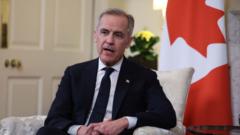As Canada grapples with turbulent trade relations, Prime Minister Mark Carney is reportedly planning to dissolve Parliament and schedule elections for April 28, 2024, positioning himself as the leader capable of confronting Donald Trump's aggressive trade policies.
Carney Expected to Announce Snap Election Amid US Trade Tensions

Carney Expected to Announce Snap Election Amid US Trade Tensions
Newly sworn-in Prime Minister Mark Carney may call for an early national election in response to escalating trade conflicts with the United States.
Newly appointed Canadian Prime Minister Mark Carney is poised to call a snap election as early as this Sunday, according to various reports. Recent tensions from a trade dispute with the United States have left Canadian businesses in crisis, prompting the former central banker to present himself as the optimal choice to deal with US President Donald Trump's tough stance. The 60-year-old Carney succeeded Justin Trudeau as leader of the Liberal Party after the latter stepped down following a lengthy term in office.
In an anticipated announcement, Carney will request the dissolution of Parliament, triggering a five-week campaign that will see him and his rivals go head-to-head. Although the request for dissolution signals the start of intense political maneuvering, reports suggest Carney is inclined towards April 28 as the election date, a detail that remains unconfirmed.
With a heightened focus on the ongoing trade war, analysts speculate that a short campaign could benefit Carney. The looming election is expected to center on Trump's tariffs and threatening rhetoric, particularly as he hinted at making Canada the 51st state. Carney has committed to imposing reciprocal tariffs if Trump's existing 25% tariffs on Canadian goods persist beyond the Canada-United States-Mexico Agreement (CUSMA) provisions. On April 2, Trump plans to introduce further tariffs, compounding the existing ones on Canadian steel and aluminum.
As the election approaches, polling suggests a tightening race between Carney's Liberals and Conservative leader Pierre Poilievre, who previously enjoyed a commanding 20-point lead before the trade threats emerged. Besides the Conservatives, Carney's Liberals will also contend with other political forces, including the Bloc Quebecois and the New Democrats (NDP), as they prepare for the electoral contest ahead.




















